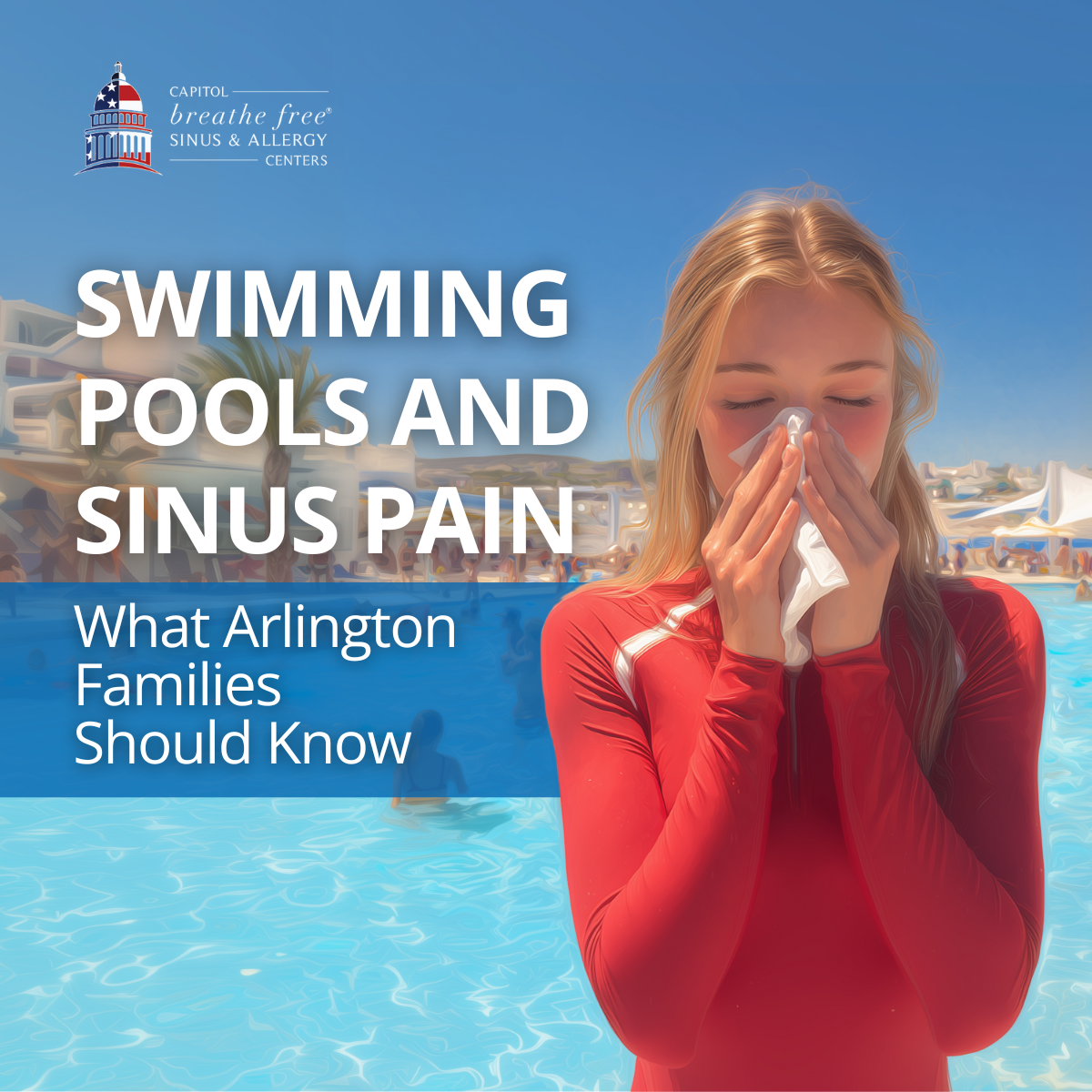Swimming Pools and Sinus Pain: What Arlington Families Should Know
There’s nothing like a dip in the pool on a hot day—especially in Arlington, where summer temperatures can soar. But for some individuals, swimming comes with an unexpected side effect: sinus pain. If your nose feels stuffy, your face aches, or you get headaches after time in the water, you’re not alone.
Let’s explore how swimming may affect your sinuses and what Arlington families can do to avoid discomfort.

Why Swimming Can Trigger Sinus Pain
Swimming is a great way to stay active and cool off, but it may lead to nasal or sinus irritation in some people. Water exposure, chemicals, and pressure changes can all play a role.
Here are common reasons swimming can contribute to sinus discomfort:
Chlorine irritation:
Public and private pools in Arlington are commonly treated with chlorine to reduce harmful microbes. However, chlorine can irritate the delicate lining of the nasal and sinus passages—especially with repeated exposure.
Water pressure:
Diving or swimming underwater can force water into the sinus cavities, especially when entering the water headfirst. This pressure may lead to congestion or facial discomfort.
Bacteria exposure:
If pool water isn’t properly maintained, bacteria can enter the nasal passages and increase the risk of sinus infections—particularly in swimmers with pre-existing nasal or sinus issues.
Existing sinus conditions:
Individuals with chronic sinusitis, allergies, or structural nasal issues may be more prone to experiencing pain, congestion, or pressure after swimming.
Signs You May Be Experiencing Swimming-Related Sinus Trouble
It’s not always easy to link sinus symptoms to pool time, but these signs may indicate a connection:
- Pressure or discomfort in the cheeks or forehead after swimming
- Persistent nasal congestion or a runny nose following pool exposure
- Headaches, particularly behind the eyes or nose
- Difficulty breathing through the nose after being in the water
- Increased frequency of sinus infections during the swimming season
If you experience these symptoms regularly, it may be time to assess your sinus health—especially if swimming is part of your routine in Arlington.
ENT Tips for Swimmers in Arlington
You don’t have to stop swimming to protect your sinuses. These ENT-recommended strategies can help you enjoy the pool while minimizing sinus discomfort:
✔️ Use a nose clip
Wearing a nose clip while swimming can help prevent water from entering the nasal passages in the first place.
✔️ Rinse with saline afterward
A saline nasal rinse after swimming helps flush out chlorine, bacteria, and other irritants. It's a simple, effective way to protect sinus health.
✔️ Shower promptly
Rinse your body and face immediately after exiting the pool. This helps remove residual chemicals from the skin and around the nasal area.
✔️ Avoid deep dives
Pressure changes from deep diving can force water into your sinuses. If you're prone to discomfort, stay in shallower water.
✔️ Monitor pool conditions
Choose pools that are well-maintained. A strong chlorine odor can signal chemical imbalance—not cleanliness. Ask about water testing if you’re unsure.
✔️ Talk to a sinus specialist
If symptoms persist, consult an ENT. Conditions like a deviated septum, chronic sinusitis, or nasal polyps can make you more sensitive to swimming-related irritation. Evaluation from a provider can lead to targeted treatment or lifestyle adjustments.
Keeping Summers Fun (and Pain-Free) in Arlington
Swimming should be a fun and healthy summer activity—not a source of frustration. If you or your child is dealing with sinus pain after pool time, don’t ignore the symptoms. The right care can make all the difference.
At Capitol Breathe Free Sinus & Allergy Centers, we help Arlington families breathe easier so they can enjoy everything the season has to offer. Whether you need prevention strategies or in-office treatment options, our team is here to support your sinus health.
Need help? Let’s get you back to feeling your best—so you can dive back in with confidence.
The information provided in this article is for informational and educational purposes only and does not constitute medical advice. It is not intended to diagnose, treat, cure, or prevent any disease or medical condition. Always seek the guidance of your physician or other qualified healthcare provider with any questions you may have regarding a medical condition or treatment.
Results may vary: Treatment outcomes and health experiences may differ based on individual medical history, condition severity, and response to care.
Emergency Notice: If you are experiencing a medical emergency, call 911 or seek immediate medical attention.

.png)
.png)